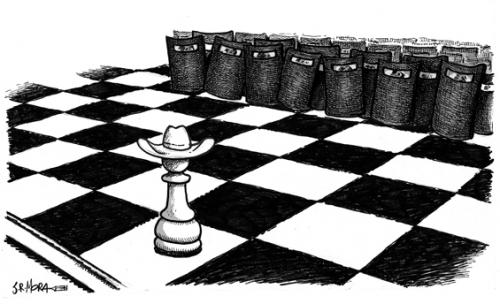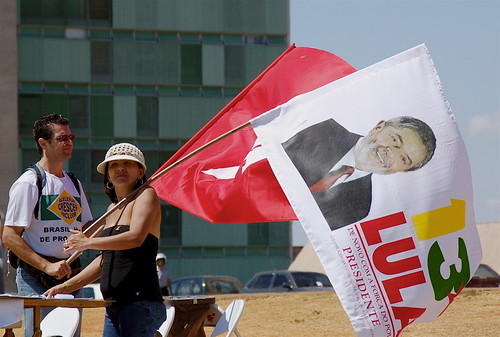latin america
Honduras: Two Latin American views on the deal to restore Manuel Zelaya

Honduras: The struggle must be more intense than ever
By Ricardo Salgado
October 30, 2009 -- Cubadebate -- Those who claimed several weeks ago that the president would be restored at the beginning of November, though bound by his hands and feet, in order to legitimate the elections, managed to describe the end that we are witnessing now. But let the record show that it is not the end of the coup; this continues in effect, its purposes prevail; the conditions that brought it about continue just as they were on June 28.
Honduras: Deal signed for Zelaya’s return, but struggle continues
October 30, 2009, report by Democracy Now! reporter Andrés Conteris in the Brazilian embassy in Tegucigalpa. Conteris has been holed up at the embassy since Zelaya took refuge there in September.
By Stuart Munckton
October 31, 2009 -- After more than 120 days of mass resistance by the poor majority of Honduras, against a coup regime that overthrew elected President Manuel Zelaya, the regime has finally signed an agreement for Zelaya’s reinstatement.
On October 30, Zelaya and the coup regime signed an agreement opening the way for the elected president to take office once more. However, the key demand of the mass resistance for a constituent assembly to rewrite the constitution is excluded by the deal until Zelaya leaves office in late January.
The National Resistance Front against the Coup (FNRG) is pledging to continue its campaign of protests around this demand (see statement following this article) and it is unclear whether it will continue with a planned boycott of the November 29 elections.
Cuba: UN for the 18th consecutive year demands end to US blockade
| |||
| Department of Public Information • News and Media Division • New York |
UN General Assembly, for 18th consecutive year, overwhelmingly calls for end to the US economic, trade embargo against Cuba
Vote: 187 in favour to 3 against, with 2 abstentions;
Cuba's 2009 report to United Nations on the US economic blockade

To be presented to the UN General Assembly on October 28, 2009
1. Introduction
Why the international media lies about events in Latin America

Hugo Blanco: Indigenous people are the vanguard of the fight to save the Earth
October 13, 2009 -- Socialist Voice -- Peruvian peasant leader Hugo Blanco, who edits the newspaper La Lucha Indigena, was interviewed on August 28, 2009, in Arequipa, in southern Peru. The previous day he gave a presentation at a conference entitled “40 Años de la Reforma Agraria” at the city’s Universidad Nacional de San Agustín.
You said last night that today the Indigenous peoples of the Amazon are in the vanguard of the struggle in Peru. Can you say more about this?
Audio: Attorney Leonard Weinglass on the Cuban Five
Workers Party of Brazil: The different strategies of the Latin American left

By Valter Pomar, secretary of international relations, Workers’ Party (PT) of Brazil
October 10, 2009 -- It has become commonplace to say that there are two lefts in Latin America: one would be “carnivore”, the other “vegetarian”; one would be radical, the other moderate; one would be revolutionary, the other reformist; one would be socialist, the other capitalist.
Dichotomous definitions of this kind are made by spokespersons (official or unofficial) of the US State Department, with the explicit purpose of bringing about discord in the Latin American left, making it fight itself rather than its common enemies.
Honduras: Interview with Juan Barahona, leader of the National Resistance Front Against the Coup
Juan Barahona. Photo: Telesur.
By Pedro Fuentes, Tegucigalpa
October 1, 2009 -- “We will not stop. We will continue to be against the coup until the last day they are in power,” Juan Barahona said in an interview at the headquarters of STYBIS, the beverage workers’ trade union. Barahona is the principal leader of the resistance, together with Carlos Reyes, president of the trade union, a close comrade of Barahona and an independent candidate for the next presidential election. Reyes is injured and cannot participate, which makes Juan appear to be most visible face of the resistance.
Honduras: The threat of a Haiti-style foreign military occupation

By Ricardo Arturo Salgado
Tegucigalpa, September 27, 2009 –- Socialist Voice –- The Honduras crisis has sparked great interest among thinkers of both right and left up and down the continent. Many people are reflecting on events, using all the analytical tools their knowledge permits. There is wide scope for speculation, mainly because – for most people – the actions of different forces have been so unexpected in character.
President Manuel Zelaya carried out his return to Honduras in a way that astonished everyone, both the coup makers and most of his followers (myself included). Of course, the countries that are said to have participated in the operation do all they can to deny prior knowledge of his trip.
Venezuela plans deeper popular democracy to address economic crisis
By Federico Fuentes, Caracas
September 24, 2009 -- Faced with the growing impact of the global economic crisis, Washington’s intentions to establish seven military bases in Colombia and growing challenges in solving structural problems, Venezuelan President Hugo Chavez reaffirmed the need to build a new state.
“We have inherited a capitalist state that serves the interests of the bourgeoisie and is still penetrated by interests contrary to the revolution. We need to carry out an internal shake up of the government structures”, Chavez said on September 19 during the second expanded council of ministers meeting, which also involved governors and mayors aligned with the Bolivarian revolution.
The meeting was called to discuss a series of new measures the revolutionary government plans to announce in coming weeks to confront some of the challenges it faces on the economic, political and social fronts. In all, 54 new measures have already been approved by his cabinet.
Global economic crisis
New figures released by the Central Bank of Venezuela (BCV) showed the national economy contracted by 1% in the first half of the year, including a 2.4% drop in the second quarter.
(Updated Oct. 6) On the spot in Honduras: The people are still on the streets!

Honduras, September 30, 2009.
* * *
